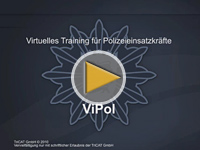April 2010 – open-end
Leibniz Graduate School for Knowledge Media Research, Budget resources of KMRC
Using virtual realities to acquire specific abilities and skills has become more common in recent years. Airline pilots, physicians, military staff and fire fighters are among those who are using serious games and virtual training at some stage of their qualification. Virtual Training in this context is more than just training. It also offers new-style opportunities for debriefing and feedback, for example, by reconstructing a training scenario and viewing it from different angles. It is possible to train specific skills and abilities which could not be trained under real-life conditions because of the high costs, danger, time or effort involved.
KMRC's first step in this project will be to conduct a field study accompanying the pilot phase of a virtual training project. We will investigate the opportunities provided by a virtual environment to acquire procedural knowledge and to interact with collaborative knowledge.
 This is a cooperative effort with the state police of Baden Württemberg, who is training different scenarios virtually. A virtual training environment named “ViPol” is being developed in the framework of the project “Polizei-Online” of the Ministry of the Interior of Baden Württemberg, in cooperation with T-Systems and the software company TriCAT. ViPol will allow police officers to train, for example, communication and interaction with a helicopter crew. Such operations could not possibly be trained with real helicopter crews because of the high costs involved, so virtual training is the obvious choice.
This is a cooperative effort with the state police of Baden Württemberg, who is training different scenarios virtually. A virtual training environment named “ViPol” is being developed in the framework of the project “Polizei-Online” of the Ministry of the Interior of Baden Württemberg, in cooperation with T-Systems and the software company TriCAT. ViPol will allow police officers to train, for example, communication and interaction with a helicopter crew. Such operations could not possibly be trained with real helicopter crews because of the high costs involved, so virtual training is the obvious choice.
KMRC will develop various instruments to measure the “virtually trained” persons’ training results, competence and confidence in real-life operations, and we will analyze the long-term effects of such training.
In further stages of our KMRC project, we will use the virtual environment for additional experiments under laboratory conditions, with a focus on implicit learning of relevant operating cues, the impact of virtual training on perceived action alternatives, and the role of cognitive capacity during virtual and real training.